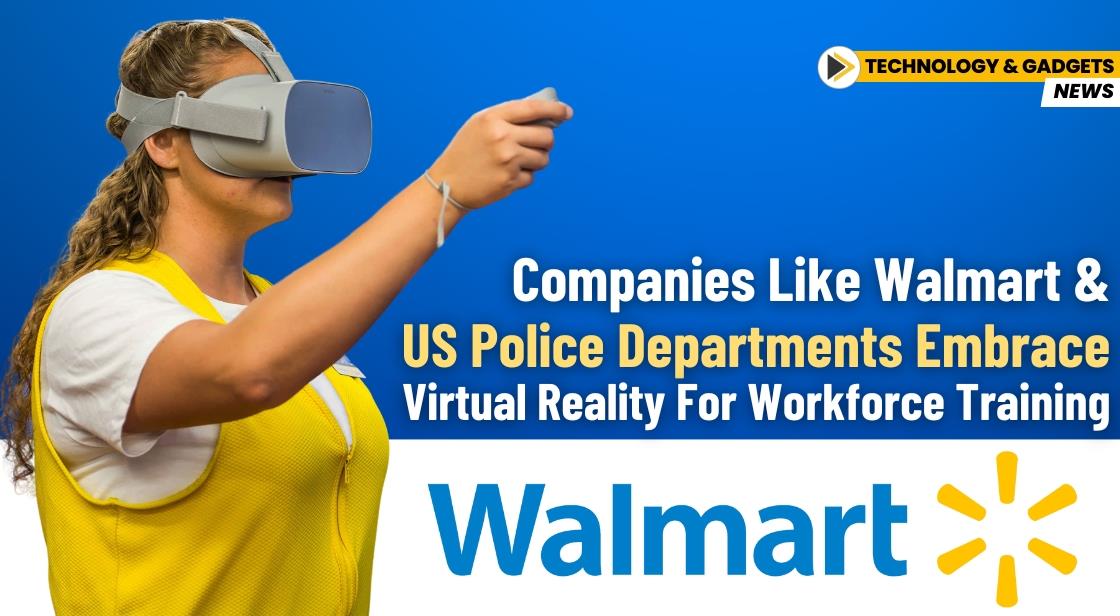Companies Like Walmart and US Police Departments Embrace Virtual Reality for Workforce Training

News Synopsis
Virtual reality (VR) is no longer just a futuristic concept confined to gaming or entertainment. Major corporations such as Walmart, Volvo, and United Parcel Service (UPS), alongside financial institutions and even police departments across the United States, are increasingly integrating VR into their workforce training programs.
According to a Wall Street Journal report, these organizations are using VR headsets to educate employees on diverse subjects like hardware maintenance, leadership, and empathy.
This growing adoption of VR technology for workforce training comes as VR headsets have become more accessible to both consumers and businesses over the past decade. Despite being around for decades, VR has only recently become widely available, thanks to advancements in technology that have made headsets more affordable and significantly reduced issues like motion sickness.
How Companies Are Using VR for Workforce Training?
Organizations are increasingly relying on VR to create immersive and practical training environments. Some are developing their own VR content in-house, while others are outsourcing to third-party developers. The VR headsets used for training are sourced from leading tech companies such as Meta, HTC, Pico, Apple, and Lenovo, known for their high-quality hardware.
According to Tuong Nguyen, a Gartner analyst, "Though it is a six-figure investment at minimum, it is still cheaper than traditional methods." This highlights the cost-effectiveness of VR training over more conventional methods, despite the significant initial investment.
Real-World Applications of VR in Workforce Training
UPS and VR Driver Training
UPS uses virtual reality to train its drivers on critical tasks such as package stacking and even how to handle unexpected situations like dog attacks. VR allows UPS to create a realistic yet safe environment where drivers can practice handling challenges that would be difficult to simulate in real life.
Walmart’s Use of VR for Soft Skills Development
Walmart has been an early adopter of VR, employing the technology to train employees in soft skills such as customer empathy. For instance, VR modules help workers navigate difficult customer interactions by allowing them to virtually experience a frustrated customer scenario, teaching them how to react with patience and professionalism.
Financial Services: St. James’s Place
London-based financial firm St. James’s Place uses VR to train its financial advisers on how to interact with clients in a variety of settings. By immersing advisers in different client scenarios, VR provides a hands-on approach to client management, allowing them to hone their interpersonal and advisory skills without the risk of real-world repercussions.
US Police Departments: VR Training for Public Safety
Across the United States, police departments have integrated VR into their training programs to prepare officers for both weapon use and civilian interactions. Through VR, officers can engage in lifelike scenarios, ranging from hostile encounters to peaceful community interactions, helping them develop better judgment and decision-making skills in high-pressure situations.
VR for Harassment and Empathy Training
Organizations are also leveraging VR for harassment prevention training. Unlike traditional video-based programs that rely on actors, VR immerses users in realistic simulations where they can experience harassment from different perspectives. This experiential learning helps individuals gain a deeper understanding of sensitive issues like harassment and empathy, fostering a more respectful workplace culture.
The Growing Appeal of VR for Workforce Training
The adoption of VR in workplace training is not just a trend but a growing necessity as organizations strive to provide more interactive and effective training programs. The ability to immerse employees in real-world scenarios without leaving the office is not only more cost-effective but also offers a more engaging and practical learning experience.
The advancements in VR technology, coupled with the growing affordability of headsets from companies like Meta and Apple, make it an increasingly attractive option for businesses looking to modernize their training programs. As more industries—ranging from retail and logistics to law enforcement and financial services—embrace VR, the technology is likely to play an even more critical role in the future of workforce training.









